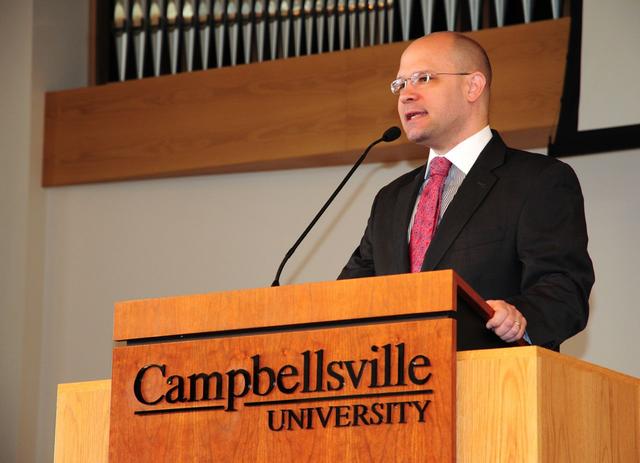| ||||||||||
Dr. Ronald P. Rogers CHIROPRACTOR Support for your body's natural healing capabilities 270-384-5554 Click here for details 


Columbia Gas Dept. GAS LEAK or GAS SMELL Contact Numbers 24 hrs/ 365 days 270-384-2006 or 9-1-1 Call before you dig Visit ColumbiaMagazine's Directory of Churches Addresses, times, phone numbers and more for churches in Adair County Find Great Stuff in ColumbiaMagazine's Classified Ads Antiques, Help Wanted, Autos, Real Estate, Legal Notices, More... 

|
Dr. Joseph Grieboski delivers message on real religious freedoms Campbellsville University hears message on religious liberties, martyrs and what the churches can do to help insure religious freedom for all people, both in America and around the world in KHIPP forum, with emphasis on persecution of Christians for religious beliefs in Chapel Service. Click on headline for story plus photo(s) By Christina Miller News from Campbellsville University CAMPBELLSVILLE, KY - "Seventy percent of the global population faces religious persecution," Dr. Joseph K. Grieboski, founder and chairman of the Board for The Institute of Religion and Public Policy, said. Grieboski spoke at Campbellsville University's weekly chapel service on Wednesday, April 6, 2011, and at Kentucky Heartland Institute on Public Policy (KHIPP). He said 200 million Christians every day face that persecution. "To put that into perspective, that is two-thirds of the U.S. population," he said. Grieboski defined a martyr as "one who faces oppression and tyranny simply because of their faith. They stand up for what they believe in--for the faith in Jesus Christ." Within the last month, a friend of his from Pakistan joined that group-- after eating breakfast and praying with his mother, he was shot 50 times...he became a martyr. "He was gunned down in front of his mother because he chose to stand up for this faith," Grieboski said of his friend, who was the only Christian in the Pakistani cabinet. "More people died for their faith in the 20th century than in all previous 19 centuries combined," he said. "Freedom of religion is also freedom of belief," he said. "If I don't have freedom, I can't speak about my beliefs and I can't write about my beliefs... Out of religious liberty flows all other rights; without it there are no other rights." The first 16 words of the First Amendment are all about freedom of religion laws. "It is American legal conceptualism that our founding fathers knew religious liberty was the most important," Grieboski said. But Grieboski has never been able to grasp why this is still happening in the world today. He said with the commitment of the American people, change could occur. "We cannot look at religious liberty as a cultural issue--it's not American, it's human. The pursuit of truth is global." Grieboski said paying closer attention and writing to members of Congress can begin a revolution of change for religious liberty in other countries. "Pray that we have strength to stand for and stand with those people--those willing to die for that greater than themselves. Protect those who do not have what we have." This story was posted on 2011-04-07 06:40:08
Printable: this page is now automatically formatted for printing.
Have comments or corrections for this story? Use our contact form and let us know.
More articles from topic News:
Richard Raines: Ageless beauty has to be genetic Columbia Parks and Rec Board Meeting, April 11, 2011 Agenda SuperBlane and Friends Relay team will hold Relay Idol Relay for Life committee members, captains, meet April 19, 2011 BJ Fudge: Likes color contrast Cedar/Redbud photo Nita Hesford is beautiful, inside and out Singing with Blakeys April 16, 2011, at Melson Ridge Easter Sunrise Service, with breakfast, in The Flatwoods (Ad) Buffalo Hills will be closing April 15, 2011 Deadline for Chamber banquet is April 12, 2011 View even more articles in topic News |


|
||||||||
|
| ||||||||||
|
Quick Links to Popular Features
Looking for a story or picture? Try our Photo Archive or our Stories Archive for all the information that's appeared on ColumbiaMagazine.com. | ||||||||||
|
Contact us: Columbia Magazine and columbiamagazine.com are published by Linda Waggener and Pen Waggener, PO Box 906, Columbia, KY 42728. Please use our contact page, or send questions about technical issues with this site to webmaster@columbiamagazine.com. All logos and trademarks used on this site are property of their respective owners. All comments remain the property and responsibility of their posters, all articles and photos remain the property of their creators, and all the rest is copyright 1995-Present by Columbia Magazine. Privacy policy: use of this site requires no sharing of information. Voluntarily shared information may be published and made available to the public on this site and/or stored electronically. Anonymous submissions will be subject to additional verification. Cookies are not required to use our site. However, if you have cookies enabled in your web browser, some of our advertisers may use cookies for interest-based advertising across multiple domains. For more information about third-party advertising, visit the NAI web privacy site.
| ||||||||||





















































